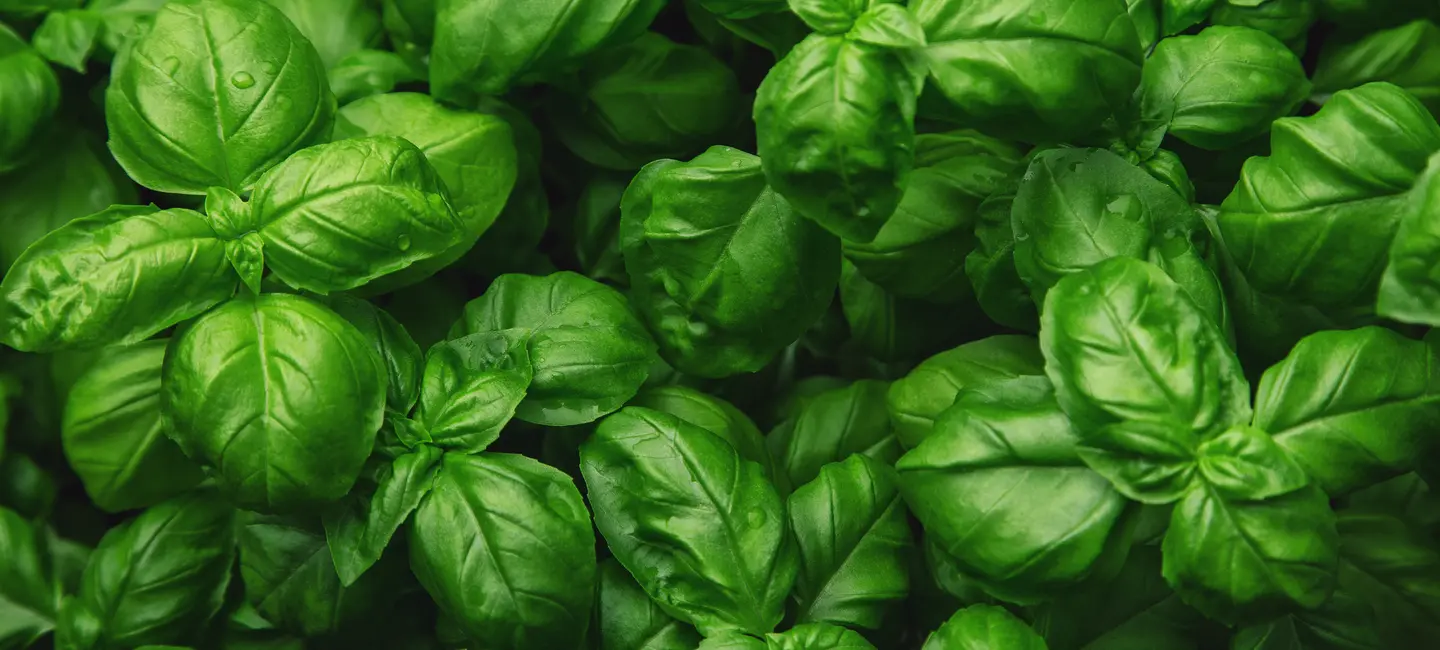
Basil is an herb. The parts of the plant that grow above the ground are used to make medicine.
Basil is commonly used for stomach problems such as spasms, loss of appetite, intestinal gas, diarrhea, constipation, and many other conditions, but there is no good scientific evidence to support these uses.
In foods, basil is used for flavor.
Is It Effective?
NatMed Pro rates effectiveness based on scientific evidence according to the following scale: Effective, Likely Effective, Possibly Effective, Possibly Ineffective, Likely Ineffective, Ineffective, and Insufficient Evidence to Rate.
- Migraine. Early research shows that applying basil essential oil to the forehead and temples every 8 hours can reduce migraine pain by a small amount in some people.
- Acne.
- Mental alertness.
- Loss of appetite.
- Common cold.
- Constipation.
- Diarrhea.
- Gas (flatulence).
- Insect bites.
- Kidney disorders.
- Infection of the intestines by parasites.
- Warts.
- Other conditions.
More evidence is needed to rate the effectiveness of basil for these uses.
Is it Safe?
Basil contains many chemicals. These chemicals might kill bacteria and fungi. Chemicals in basil might reduce symptoms in the gastrointestinal tract.
When taken by mouth: Basil is LIKELY SAFE when consumed in food amounts. When taken by mouth as a medicine, basil is POSSIBLY UNSAFE. Basil herb and basil oil contain estragole. Estragole is a chemical that might increase the risk of getting liver cancer.
When applied to the skin: Basil essential oil is POSSIBLY SAFE when applied to the skin in concentrations of up to 6% for 12 weeks.
When inhaled as aromatherapy: There isn't enough reliable information to know to know if basil is safe or what the side effects might be.
Special Precautions & Warnings:
Pregnancy and breast-feeding: Basil is LIKELY SAFE for pregnant and breast-feeding women in food amounts. But larger medicinal amounts are POSSIBLY UNSAFE. Basil contains a chemical, estragole, which has caused liver cancer in laboratory mice.
Children: Basil is LIKELY SAFE for children in food amounts. But larger medicinal amounts are POSSIBLY UNSAFE. Basil contains a chemical, estragole, which has caused liver cancer in laboratory mice.
Bleeding disorders: Basil oils and extracts might slow blood clotting and increase the risk of bleeding in people with bleeding disorders.
Low blood pressure: Basil extracts might lower blood pressure. In theory, taking basil extracts might make blood pressure become too low in people with low blood pressure.
Surgery: Basil oils and extracts might slow blood clotting. In theory, basil oils or extracts might increase the risk of bleeding during surgical procedures. Stop using basil at least 2 weeks before a scheduled surgery.
Medications for high blood pressure (Antihypertensive drugs)
Interaction Rating=Moderate Be cautious with this combination.
Basil extract might decrease blood pressure in some people. Taking basil extract along with medications used for lowering high blood pressure might cause your blood pressure to go too low. Do not take too much basil if you are taking medications for high blood pressure.
Some medications for high blood pressure include captopril (Capoten), enalapril (Vasotec), losartan (Cozaar), valsartan (Diovan), diltiazem (Cardizem), amlodipine (Norvasc), hydrochlorothiazide (HydroDIURIL), furosemide (Lasix), and many others.
Medications that slow blood clotting (Anticoagulant / Antiplatelet drugs)
Interaction Rating=Moderate Be cautious with this combination.
Basil oils and extracts might slow blood clotting. Taking basil oils or extracts along with medications that also slow clotting might increase the chances of bruising and bleeding.
Some medications that slow blood clotting include aspirin, clopidogrel (Plavix), dalteparin (Fragmin), enoxaparin (Lovenox), heparin, ticlopidine (Ticlid), warfarin (Coumadin), and others.
Herbs and supplements that might lower blood pressure: Basil extract might lower blood pressure. Using it along with other herbs and supplements that have this same effect might increase the risk of blood pressure dropping too low in some people. Some of these herbs and supplements include andrographis, casein peptides, cat's claw, coenzyme Q-10, fish oil, L-arginine, lyceum, stinging nettle, theanine, and others.
Herbs and supplements that might slow blood clotting: Using basil oil or extracts along with other herbs and supplements that can slow blood clotting might increase the risk of bleeding in some people. Some of these herbs and supplements include angelica, clove, danshen, feverfew, fish oil, garlic, ginger, ginkgo, Panax ginseng, horse chestnut, red clover, turmeric, vitamin E, and others.
There are no known interactions with foods.
The appropriate dose of basil depends on several factors such as the user's age, health, and several other conditions. At this time there is not enough scientific information to determine an appropriate range of doses for basil. Keep in mind that natural products are not always necessarily safe and dosages can be important. Be sure to follow relevant directions on product labels and consult your pharmacist or physician or other healthcare professional before using.
Albahaca, Basilic, Basilic Commun, Basilic Grand, Basilic Grand Vert, Basilic Romain, Basilic aux Sauces, Basilici Herba, Basilici Herba, Common Basil, Garden Basil, Munjariki, Ocimum basilicum, St. Josephwort, St. Joseph's Wort, Surasa, Sweet Basil, Vanatulasi, Varvara.
Information on this website is for informational use only and is not intended to replace professional medical advice, diagnosis, or treatment. While evidence-based, it is not guaranteed to be error-free and is not intended to meet any particular user’s needs or requirements or to cover all possible uses, safety concerns, interactions, outcomes, or adverse effects. Always check with your doctor or other medical professional before making healthcare decisions (including taking any medication) and do not delay or disregard seeking medical advice or treatment based on any information displayed on this website.
© TRC Healthcare 2024. All rights reserved. Use and/or distribution is permitted only pursuant to a valid license or other permission from TRC Healthcare.
